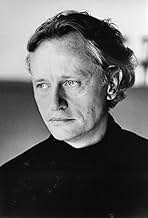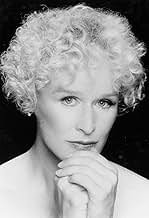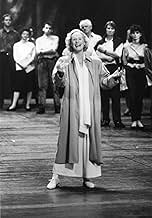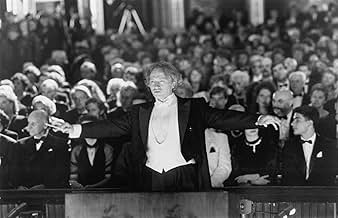NOTE IMDb
6,6/10
1,5 k
MA NOTE
Ajouter une intrigue dans votre langueHungarian conductor plans bold "Tannhäuser" production amid opera politics, artistic egos, nationalism, union conflicts, and funding challenges in critique of Grand Opera and European Union.Hungarian conductor plans bold "Tannhäuser" production amid opera politics, artistic egos, nationalism, union conflicts, and funding challenges in critique of Grand Opera and European Union.Hungarian conductor plans bold "Tannhäuser" production amid opera politics, artistic egos, nationalism, union conflicts, and funding challenges in critique of Grand Opera and European Union.
- Réalisation
- Scénario
- Casting principal
- Récompenses
- 3 victoires et 2 nominations au total
Johara Farley
- Dancer
- (as Johara Racz)
Dieter Rita Scholl
- Delfin Van Delf
- (as Rita Scholl)
Avis à la une
The Hungarian conductor Zoltan Szanto (Niels Arestrup) is invited to conduct Tannhäuser by Richard Wagner in Paris. Szanto has to face problems with the ego of the artists, strikes and his family since he falls in lover with the diva Karin Anderson (Glenn Close). But in the end, his love for Karin and passion for Wagner bring redemption to him.
One movie that I regret that has not been released on DVD or Blu-Ray in Brazil is "Meeting Vênus", of 1991 from the critically acclaimed Hungarian director István Szabó and with Glenn Close in the top of her career in the role of a problematic diva.
Using the staging of opera "Tannhäuser" by Richard Wagner in Paris as background, this wonderful feature is a satire of the unification of Europe that was happening in that historical moment through the ego of the musicians from different countries in the orchestra where the character of Glenn Close is the lead attraction.
Just as information, Vênus is the mundane woman or goddess that the troubadour Tannhäuser has sex in the medieval legend that the opera is based.
The mime of Glenn Close, dubbed by Kiri Te Kanawa, is perfect and the climax of this movie is the entrance of the artists singing Pilgrims Chant in the opera house and Szanto's stick blossoming. I have seen this scene several times on my VHS that I have seen at least four times. My vote is ten.
Title (Brazil) : "Encontro com Vênus" ("Meeting Venus")
One movie that I regret that has not been released on DVD or Blu-Ray in Brazil is "Meeting Vênus", of 1991 from the critically acclaimed Hungarian director István Szabó and with Glenn Close in the top of her career in the role of a problematic diva.
Using the staging of opera "Tannhäuser" by Richard Wagner in Paris as background, this wonderful feature is a satire of the unification of Europe that was happening in that historical moment through the ego of the musicians from different countries in the orchestra where the character of Glenn Close is the lead attraction.
Just as information, Vênus is the mundane woman or goddess that the troubadour Tannhäuser has sex in the medieval legend that the opera is based.
The mime of Glenn Close, dubbed by Kiri Te Kanawa, is perfect and the climax of this movie is the entrance of the artists singing Pilgrims Chant in the opera house and Szanto's stick blossoming. I have seen this scene several times on my VHS that I have seen at least four times. My vote is ten.
Title (Brazil) : "Encontro com Vênus" ("Meeting Venus")
This movie is really something different. It's all about music. It is about the desperate attempt of an idealistic hungarian conductor to perform "Tannhaeuser" in the opera house of Paris. The problems he encounters are unbelievable... and for us viewers, unbelievably funny.
What really is wonderful about this movie is of course the music. It shows how much passion and love lies within classic music, and how much work there is to do until the staff of such a big production is finally in synch.
This film also offers a chance to get an insight into classical music pieces. Some of the most splendid passages of Wagners "Tannhaeuser" can be listened to in full beauty, and thus the film might tempt some people to overcome their inhibitions and to dive into the world of opera.
For those more interested in characterization there are a lot of weird persons playing in this story, showing different kinds of European lifestyle and tackling topics like prejudice, bureaucracy and of course love.
What really is wonderful about this movie is of course the music. It shows how much passion and love lies within classic music, and how much work there is to do until the staff of such a big production is finally in synch.
This film also offers a chance to get an insight into classical music pieces. Some of the most splendid passages of Wagners "Tannhaeuser" can be listened to in full beauty, and thus the film might tempt some people to overcome their inhibitions and to dive into the world of opera.
For those more interested in characterization there are a lot of weird persons playing in this story, showing different kinds of European lifestyle and tackling topics like prejudice, bureaucracy and of course love.
This film is much more than a customary movie about opera, though opera lovers get first-rate extracts from Wagner's Tannhauser as well. The action takes place in an imaginary "Opera Europe" in Paris. István Szabó, the excellent film director is really interested here in fanatic people of the theater who came from several countries of Europe to unite their talent in order to create a successful performance of Wagner's youthful masterpiece. The ensemble is a mixture of multinational people: the head of the company (a Spaniard, a former hero of the Spanish Civil War,) her private secretary and mistress (descendant of a noble Russian family,) the conductor (a talented young Hungarian who suffers from inferiority complex because of his East-block origin,) the singer who plays Tannhauser (a permanently offended dumpy man from the DDR with beautiful voice,) the French theatrical technician (a pig headed trade unionist who causes much trouble,) etc. They carry with themselves all good and vicious habits and traditions of their origin which cause many conflicts but humorous episodes as well during the rehearsals. There is a remarkable scene when at a dinner party the protagonists put aside all of their conflicts and sing together a song called "Suliko" which was once Stalin's favorite. (They sing it not because they love Stalin, but because of a certain nostalgia for their youth.) In the center of the story stands the Hungarian conductor's and a Nordic singer's (played by Glenn Close) stormy love affair which ends in diminuendo (using here deliberately this term of music.) Strongly recommended for everyone who loves art and theater.
A marvelous film that anyone with an interest in classical music will enjoy - be they an opera lover or hater. Excellent bravura performances by Close and Arestrup conjure up a heady mix of artistic temperament, the politics of "The Arts" and great music. It is great fun. The film is exuberantly directed and the pace never lets up. A triumph for Director Victor Szabo.
I've seen this movie many times now. It covers most of the things that is evident in an opera house and productions. Though some of the sceneries, dramatic situations are slightly exaggerated, I still think it is well achieved attempt to recreate typical scenes of an opera production, love stories, conflicts with opera managers, strikes, problems with orchestral musicians and singers, corrupt non-environmental cooperation sponsors, Paris and Budapest cultural milieus.
But there is some small flaws. Erland Josephson who plays Picabia (General Director of Opera Europa) is a great actor but he doesn't do it all well with his Spanish pronunciation and pronounces Karin in with real Swedish accent. Otherwise he's portraying the role of with absolute perfection.
Glenn Close is simply marvelous as the Swedish soprano and Niels Arestrup as Maestro Szanto is very credible in his role as the conductor.
The music from Tannhäuser by Richard Wagner works as a third character in this movie, same function as the other movie Amadeus (1984) by Milos Forman. I would recommend anyone to see this movie, to simply enjoy it over a nice evening!!
But there is some small flaws. Erland Josephson who plays Picabia (General Director of Opera Europa) is a great actor but he doesn't do it all well with his Spanish pronunciation and pronounces Karin in with real Swedish accent. Otherwise he's portraying the role of with absolute perfection.
Glenn Close is simply marvelous as the Swedish soprano and Niels Arestrup as Maestro Szanto is very credible in his role as the conductor.
The music from Tannhäuser by Richard Wagner works as a third character in this movie, same function as the other movie Amadeus (1984) by Milos Forman. I would recommend anyone to see this movie, to simply enjoy it over a nice evening!!
Le saviez-vous
- AnecdotesOpera singer Kiri Te Kanawa dubbed the singing voice of lead actress Glenn Close.
- Citations
Zoltan Szanto: I could mix up my work with my private life.
- Bandes originalesTannhäuser
(extraits)
Music by Richard Wagner
Performed by Kiri Te Kanawa, René Kollo, Håkan Hagegård, Waltraud Meier,
Renate Spingler, Matthias Hölle, Kim Begley, Robin Leggate, Rodney Macann,
, Roderick Earle with The Philharmonia Orchestra (as London Philharmonia Orchestra)
Conducted by Marek Janowski
Meilleurs choix
Connectez-vous pour évaluer et suivre la liste de favoris afin de recevoir des recommandations personnalisées
- How long is Meeting Venus?Alimenté par Alexa
Détails
- Date de sortie
- Pays d’origine
- Langues
- Aussi connu sous le nom de
- Meeting Venus
- Lieux de tournage
- Sociétés de production
- Voir plus de crédits d'entreprise sur IMDbPro
Box-office
- Montant brut aux États-Unis et au Canada
- 1 000 348 $US
- Week-end de sortie aux États-Unis et au Canada
- 65 715 $US
- 17 nov. 1991
- Montant brut mondial
- 1 000 348 $US
Contribuer à cette page
Suggérer une modification ou ajouter du contenu manquant





























